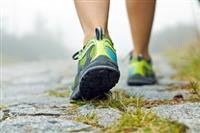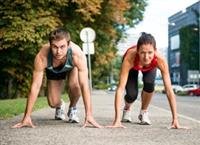Basic Items for Marathon Training
The daunting challenge in covering 26.2 miles may seem like you need a lot of things to get started. Actually, marathon training is one of the simplest and purest sports out there.

You don't need to complicate your training with a lot of unnecessary things. To get started in a marathon training program, you really only need these items.
- Running shoes - do you have a comfortable, broken-in pair of running shoes? If not, buy a comfortable pair (given many, many options - figuring out your best running shoe is outside the scope of this article) and begin breaking them in now. If you don't know what to buy, go to a running-specific store and have a salesperson help you. Most big box department stores are clueless on what type of shoe is appropriate for you.
- Training clothes - you don't need anything fancy for training, but they should be temperature appropriate for the climate you're running in. Also, wear training clothes that minimize chafing.
- Race clothes - you'll need race appropriate clothes that you've done at least one long training run in. Wicking socks are great to minimize blisters!

That's really all you need to get started. Some nice additions are:
- Wrist watch - most anything will do, but one with a digital reading is probably easiest. It's not completely necessary, but a wrist watch will be very helpful for training.
- GPS watch - great for determining distance and pacing, plus some will help save training run history
- Anti-Chafing - as you put on the miles in training, certain areas of the body are prone to chafe.
Great GPS Watches for Marathoners
Garmin Forerunner 10 Garmin Forerunner 310XTRecover from Hitting the Wall Timex Ironman Run Trainer
You'll also want to consider basic outdoor items like wearing sun screen and a hat or cap, if you'll be training outdoors in the sun.
Drinking while you're training is a good idea. Drink water during shorter runs, and either water or sports drink during longer runs. Full calorie sports drink is a good idea in longer runs as it provides electrolytes plus carb replishment, which will help you avoid bonking. (see Recover from Hitting the Wall)
Essentials
Here's a checklist of essential items to help you get ready for the big race:
- Running shoes: Choose a comfortable and well-fitting pair of running shoes that you've broken in during your training.
- Technical clothing: Wear moisture-wicking, breathable, and lightweight clothing, including shorts/tights, a shirt or tank top, and socks made of synthetic materials to prevent chafing and blisters.
- Race bib and safety pins: Don't forget your official race bib, along with safety pins to secure it to your shirt.
- GPS watch or smartphone: Track your pace, distance, and time during the race using a GPS watch or a running app on your smartphone.
- Hydration and fuel: Carry a water bottle, hydration pack, or plan to use the water stations along the course. Also, pack energy gels, chews, or bars for mid-race fueling.
- Anti-chafing balm or petroleum jelly: Apply it to areas prone to chafing, such as inner thighs, underarms, and nipples, to reduce friction and irritation.
- Sun protection: Wear sunscreen with a high SPF, sunglasses, and a hat or visor to protect yourself from sunburn and glare.
- Running belt or armband: Use a running belt or armband to carry your phone, keys, ID, and any other personal items you may need.
- Post-race clothing and footwear: Pack a change of clothes, including a warm layer, and comfortable shoes to wear after the race.
- First aid kit: Bring adhesive bandages, blister pads or moleskin, and any personal medications you may need during the race, such as pain relievers or allergy medication.
- Pre-race nutrition: Plan your pre-race meal and snacks, ensuring they are easy to digest and contain a balance of carbohydrates and protein.
- Final race instructions and course map: Review the race instructions, start time, and course map to familiarize yourself with the route and logistics.
- Transportation and lodging: Arrange transportation to and from the race, and book any necessary accommodations if you're traveling from out of town.
- Mental preparation: Develop a race-day strategy, including pacing, hydration, and fueling plans, and practice visualization and relaxation techniques.
By ensuring you have all these items and considerations covered, you'll be well-prepared to run your marathon with confidence and success.





